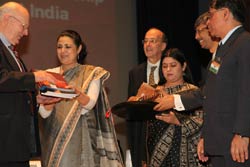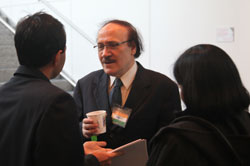NIH hosts Indo-US science and technology meeting
November - December, 2009 | Volume 8, Issue 6

Photos by Jeff Gray
Fogarty Director Dr. Glass told participants of
the US-India Joint Working Group on Prevention
of Sexually Transmitted Diseases and HIV/AIDS
that the new US administration is committed
enhancing research partnerships with India.

India’s Secretary of Biotechnology, Dr. M.K.
Bhan, met with Indian post-docs doing
fellowships at NIH to discuss employment
opportunities available to them in India’s
booming research enterprise. The Indian
government is tripling its investment in science
and technology.
A high-level meeting focused on increasing interactions between the United States and India in the areas of biomedical research, engineering, and technology recently convened at NIH. The
Indo-U.S. Science and Technology Forum (IUSSTF), the sponsor of the meeting, was established in 2000 as an autonomous, non-profit society to facilitate increased cooperation between the two countries. The group is comprised of senior government officials, members of academia and representatives of private industry.
"These collaborations go back 20 years," said Fogarty director Dr. Roger I. Glass, one of the governing members of the organization. "This forum is really about how we can sustain and build on these partnerships."
In addition to numerous presentations and discussions, the meeting also featured the release of the organization's latest progress report, which emphasizes India's development as a knowledge center. With the recent establishment of several new science and technology institutions, the report says the scope for enhanced engagement between India and the U.S. "holds promising, but nevertheless, challenging potential." It also identifies the need for new models and frameworks for collaborative efforts in order to seize the emerging opportunities.
"India is poised for a transformational change" said Dr. T. Ramasami, Secretary of India's Department of Science and Technology. "In recent years, decisions were made to triple the Indian government's investments into science and technology."
Several Indo-U.S. advances in the biomedical sciences are showcased, including new low-cost diagnostic and therapeutic technologies, cutting-edge mitochondrial research, holistic approaches to autism and the integration of basic sciences into public health. Three new developments in cancer biology being researched jointly by U.S. and Indian institutions are also highlighted - targeted therapeutics, stem cells and nanotechnology.
India's ambassador to the U.S. Meera Shankar says the countries share a rich history of scientific collaboration that holds great potential. "Today, the Indian-U.S. relationship has transformed into a strategic partnership," she said. "Cooperation in science and technology between India and the United States will be a very important instrument for finding solutions to the common challenges that we face."
More Information
To view Adobe PDF files,
download current, free accessible plug-ins from Adobe's website.